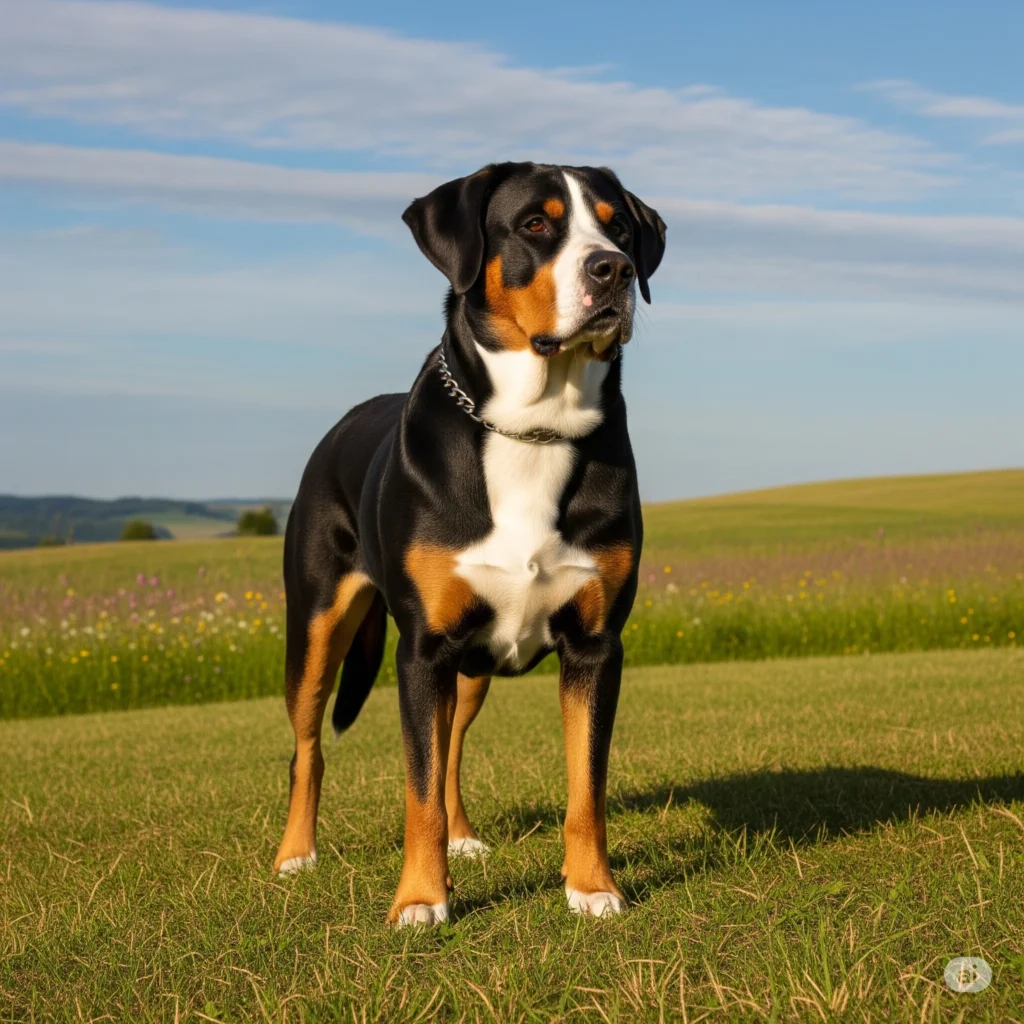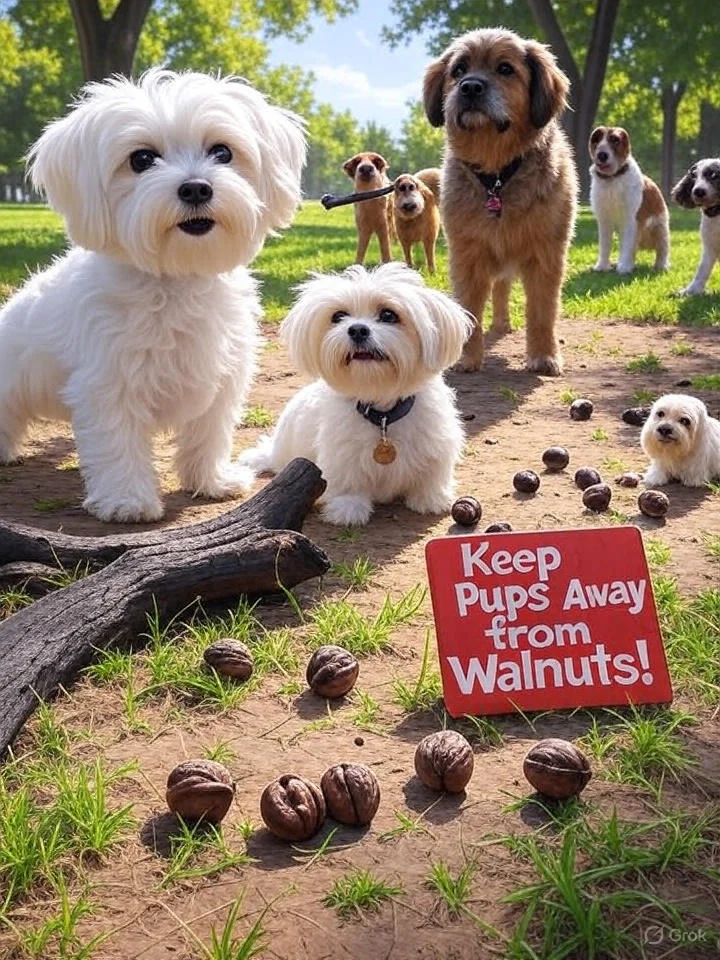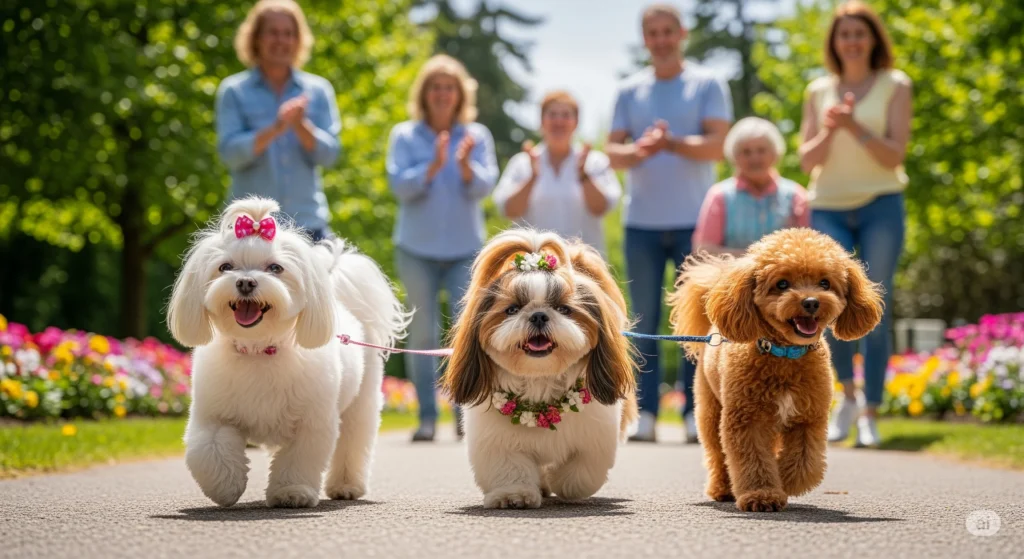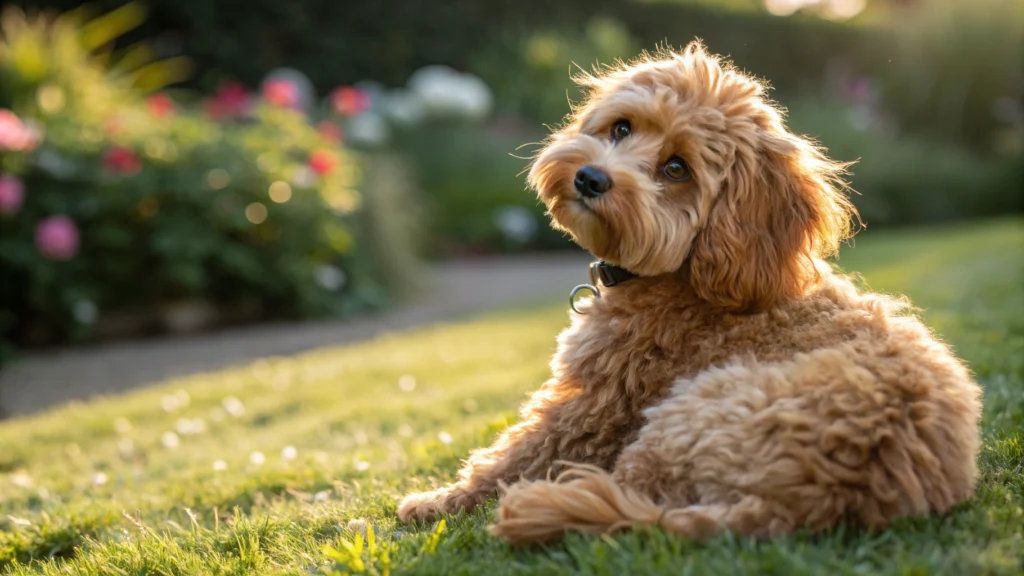
Hey, ever met a Greater Swiss Mountain Dog? These big, fluffy goofballs are like the teddy bears of the dog world, straight outta the Swiss Alps. They’re strong, loyal, and have this cool tricolor coat that makes them look like they just stepped out of a postcard. I’m gonna spill all the tea on these awesome dogs—everything from their history to whether they’d be your next furry bestie. Trust me, by the end, you’ll either want one or at least wanna give one a big ol’ belly rub!
Greater Swiss Mountain Dog History
Origins in the Swiss Alps
Picture this: snowy Swiss mountains, and these beefy dogs trotting around like they own the place. The Greater Swiss Mountain Dog comes from way back, like 2,000 years ago, when Roman soldiers brought their mastiff buddies to Switzerland. Those guys mixed with local farm dogs, and boom—Swissies were born, ready to rule the Alps.
Role as a Working Dog
These dogs were the ultimate farm helpers. They’d pull carts loaded with stuff like milk or firewood—basically the pickup trucks of the old days. They also herded cows and kept an eye on the farm. No tractor? No problem! A Greater Swiss Mountain Dog could haul a ton (literally) without breaking a sweat.
Rediscovery in the 20th Century
Okay, so these guys almost went extinct in the 1800s when machines took over. Sad, right? But then this dude, Albert Heim, was like, “Not on my watch!” He found some Swissies in the early 1900s, got their vibe going again, and saved the breed. Now they’re rare but loved, and the American Kennel Club gave them a thumbs-up in 1995.
Greater Swiss Mountain Dog Height
Male Height Range
Male Swissies are tall, like “whoa, that’s a big dog” tall—think 25.5 to 28.5 inches at the shoulder. They’re basically the basketball players of the dog world, towering over most other breeds with that proud, chest-puffed stance.
Female Height Range
The ladies are a smidge shorter, around 23.7 to 27 inches. Still super impressive, though! They’ve got this perfect mix of “I’m tough” and “I’m graceful,” making them just as eye-catching as the Greater Swiss Mountain Dog dudes.
Comparison to Other Breeds
Compared to their cousin, the Bernese Mountain Dog, Swissies are about the same height but chunkier. They’re not as massive as, say, a Great Dane, but they’ve got enough height to make you think twice before challenging them to a wrestling match.
Greater Swiss Mountain Dog Weight
Male Weight Range
Guys, these male Swissies are heavyweights—115 to 140 pounds! They’re built like tanks, perfect for pulling carts or just looking like they could bench press you. That’s a lotta Greater Swiss Mountain Dog to love.
Female Weight Range
Female Swissies are lighter, between 85 and 110 pounds. Still no lightweight, though—they’re strong enough to do all the same farm chores as the boys, just with a bit more finesse.
Impact on Lifestyle
Owning one of these big babies means you need space. Like, don’t try squeezing them into a tiny apartment—they’ll knock over your coffee table just wagging their tail. Plus, feeding a Greater Swiss Mountain Dog isn’t cheap, and vet bills for big dogs can add up, especially for stuff like joint care.
Greater Swiss Mountain Dog Temperament
Personality Traits
Swissies are the chillest giants you’ll ever meet. They’re confident, happy, and kinda like that friend who’s always up for an adventure but also loves a good nap. A Greater Swiss Mountain Dog is loyal and ready to work, but they’ve got a goofy side too.
Interaction with Humans
These dogs are all about their people. They’ll give you heart-eyes all day and love hanging out with you. They might give strangers the side-eye at first, but once they know you’re cool, they’re all cuddles and wags.
Protective Instincts
Swissies make great watchdogs. They’ve got a big bark to let you know if something’s up, like a shady squirrel invading the yard. They’re not mean, though—just protective enough to make you feel safe without scaring the mailman too much.
Greater Swiss Mountain Dog Lifespan
Average Lifespan
These big pups live about 8 to 11 years, which is pretty good for a dog their size. With some TLC, you’ll have a Greater Swiss Mountain Dog buddy for a solid decade or so.
Factors Affecting Longevity
Stuff like bloat or joint issues can mess with their lifespan, so keep an eye out. Good food, regular vet visits, and plenty of playtime help them live their best life. Genetics matter too—healthy parents mean healthier pups.
Health Considerations
Big dogs like Swissies can have hip problems or eye issues, so regular checkups are a must. Ear infections? Yeah, those floppy ears need cleaning. A solid breeder who tests for health stuff makes a big difference for your Greater Swiss Mountain Dog.
Is a Greater Swiss Mountain Dog a Good Family Dog?
Compatibility with Children
Swissies are awesome with kids—total gentle giants. They’ll let your little ones climb all over them (with supervision, ‘cause, you know, size). Older kids will love their playful energy, making them a fun family pal.
Interaction with Other Pets
With some early intros, Greater Swiss Mountain Dogs get along with other pets, even cats. They might try to herd your tabby at first, but a little training fixes that. They’re cool in a house full of furballs.
Family Lifestyle Fit
If your family loves hiking or lives in a big house with a yard, a Swissy’s your match. They need space and action, so if you’re a couch potato or always gone, they might not vibe with you. They’re clingy in the best way.
Why Are Greater Swiss Mountain Dogs So Rare?
Historical Decline
Back in the day, machines stole the Swissy’s job, and they almost disappeared. By the 1800s, they were like the dodo of dogs—super rare. Thank goodness for that Heim guy saving the Greater Swiss Mountain Dog!
Limited Breeding
Only about 120 Swissy puppies are born in Switzerland each year. Breeders are super picky to keep the quality high, which means fewer pups. That’s why you don’t see these guys everywhere.
Modern-Day Rarity
Compared to fluffier Bernese Mountain Dogs, Swissies are like the cool, obscure band nobody’s heard of yet. Their size and exercise needs scare off some folks, so only true fans tend to snag a Greater Swiss Mountain Dog.
How Big Do Swiss Mountain Dogs Get?
Overall Size Overview
These dogs are huge—males hit up to 28.5 inches and 140 pounds, females a bit smaller. They’re like walking mini-mountains, all muscle and fluff, perfect for showing off at the dog park.
Comparison to Other Swiss Breeds
Swissies are the biggest of the Swiss mountain dog crew, beating out Bernese, Appenzellers, and Entlebuchers. If you want the ultimate tank of a dog, the Greater Swiss Mountain Dog is your pick.
Space Requirements
You need a big yard or a rural spot for these guys. They’re not apartment dogs—imagine a Swissy trying to turn around in a tiny living room. Disaster! They need room to stretch those legs.
Do Swiss Mountain Dogs Bark a Lot?
Barking Tendencies
Swissies have a big, booming bark, but they’re not yappy. They’ll let you know if something’s off, like a stranger at the door or a rogue raccoon. Otherwise, they’re pretty chill vocally.
Triggers for Barking
They bark at weird noises or new people, ‘cause they’re natural watchdogs. A Greater Swiss Mountain Dog isn’t gonna let a sketchy delivery guy sneak by without a heads-up.
Managing Vocalization
Teach them a “hush” command, and you’re golden. Socializing them early keeps them from freaking out over every little thing. A calm owner means a calm Swissy, so no stressy barking sessions.
How Long Can a Greater Swiss Mountain Dog Be Left Alone?
Tolerance for Solitude
Swissies are total velcro dogs—they love being with you. They can chill alone for a few hours, but don’t leave ‘em all day. They’ll miss you too much and might get mopey.
Signs of Separation Anxiety
If they’re chewing your shoes or barking like crazy when you’re gone, your Greater Swiss Mountain Dog might be stressed. They’re not fans of long solo time, especially when young.
Strategies for Alone Time
Get a crate or some puzzle toys to keep them busy. Start with short alone times and build up. A tired Swissy is a happy Swissy, so give ‘em a good walk before you head out.
Are Swiss Mountain Dogs Hard to Train?
Trainability Overview
Swissies are smart and wanna make you happy, so training’s not too bad. They can be a bit stubborn, like “nah, I’m good,” but with patience, they’ll come around.
Training Challenges
Their independent side can make them test you, especially if you’re not consistent. A Greater Swiss Mountain Dog’s size means you gotta be the boss, or they’ll walk all over you (figuratively, hopefully).
Effective Training Methods
Treats and belly rubs work wonders. Keep sessions short and fun, ‘cause they get bored. Early training and socialization turn your Swissy into a well-behaved gentle giant.
Do Swiss Mountain Dogs Shed a Lot?
Shedding Patterns
Swissies shed a decent amount all year, but spring and fall? It’s a fur-pocalypse. Their thick double coat means you’ll find Greater Swiss Mountain Dog hair everywhere during shedding season.
Grooming Requirements
Brush ‘em once a week, more when they’re blowing their coat. A quick bath now and then keeps them fresh. It’s not high-maintenance, but you’ll need a good vacuum.
Managing Shedding
Grab a deshedding tool and go to town. Grooming gloves are awesome too. If you don’t want your couch looking like a Swissy exploded, stay on top of the brushing.
Do Swiss Mountain Dogs Like the Cold?
Adaptation to Cold Climates
These dogs were made for snowy Alps, so cold weather is their jam. A Greater Swiss Mountain Dog will happily romp in the snow like it’s their personal playground.
Sensitivity to Heat
Hot weather, though? Nope. Their thick coat makes them overheat fast. Keep ‘em cool in summer with shade and AC, or they’ll be panting like they ran a marathon.
Outdoor Activity Preferences
Swissies love winter hikes or pulling you on a sled (seriously, they can do that). Stick to early morning or evening walks in summer to keep your Greater Swiss Mountain Dog comfy.
Red Greater Swiss Mountain Dog
Tricolor Coat Description
Swissies rock a black, white, and red coat that’s straight-up gorgeous. The red’s more like a rusty shade, popping up on their face, legs, and sides, giving them that classic Greater Swiss Mountain Dog look.
Role of Red in Markings
The red bits are like their signature style—think cool eyebrow spots and leg patches. It’s not just for looks; it’s part of what makes them Swissies, though they care more about work than fashion.
Coat Maintenance
Brush that coat weekly to keep it shiny. Shedding season means daily brushing to avoid fur tumbleweeds. A little effort keeps those red markings looking sharp on your Greater Swiss Mountain Dog.
Greater Swiss Mountain Dog Price
Cost of Puppies
A Swissy puppy from a good breeder runs $1,500 to $3,000. That’s for a pup with health checks and a solid family tree. Worth it for a quality Greater Swiss Mountain Dog, right?
Factors Influencing Price
Fancy bloodlines or top-notch breeders jack up the price. Where you live matters too—city breeders might charge more. Rarity means you’re paying for something special.
Adoption vs. Breeder Costs
Adopting can save you cash—think $300 to $800 through a rescue. But finding a Greater Swiss Mountain Dog to adopt is like finding a unicorn. Breeders give you more certainty but cost more.
Greater Swiss Mountain Dog for Sale, Where Can I Buy?
Finding Reputable Breeders
Check out the AKC or the Greater Swiss Mountain Dog Club of America for legit breeders. Visit them, meet the pups’ parents, and make sure they’re doing right by the dogs.
Adoption Options
Rescues like the Greater Swiss Mountain Dog Rescue Foundation are gold if you wanna adopt. Shelters or the AKC Marketplace might have Swissies looking for a home too.
Avoiding Scams
Don’t fall for sketchy online deals. Stick to breeders who show you health records and let you visit. A little research gets you a happy, healthy Greater Swiss Mountain Dog.
you may like it






